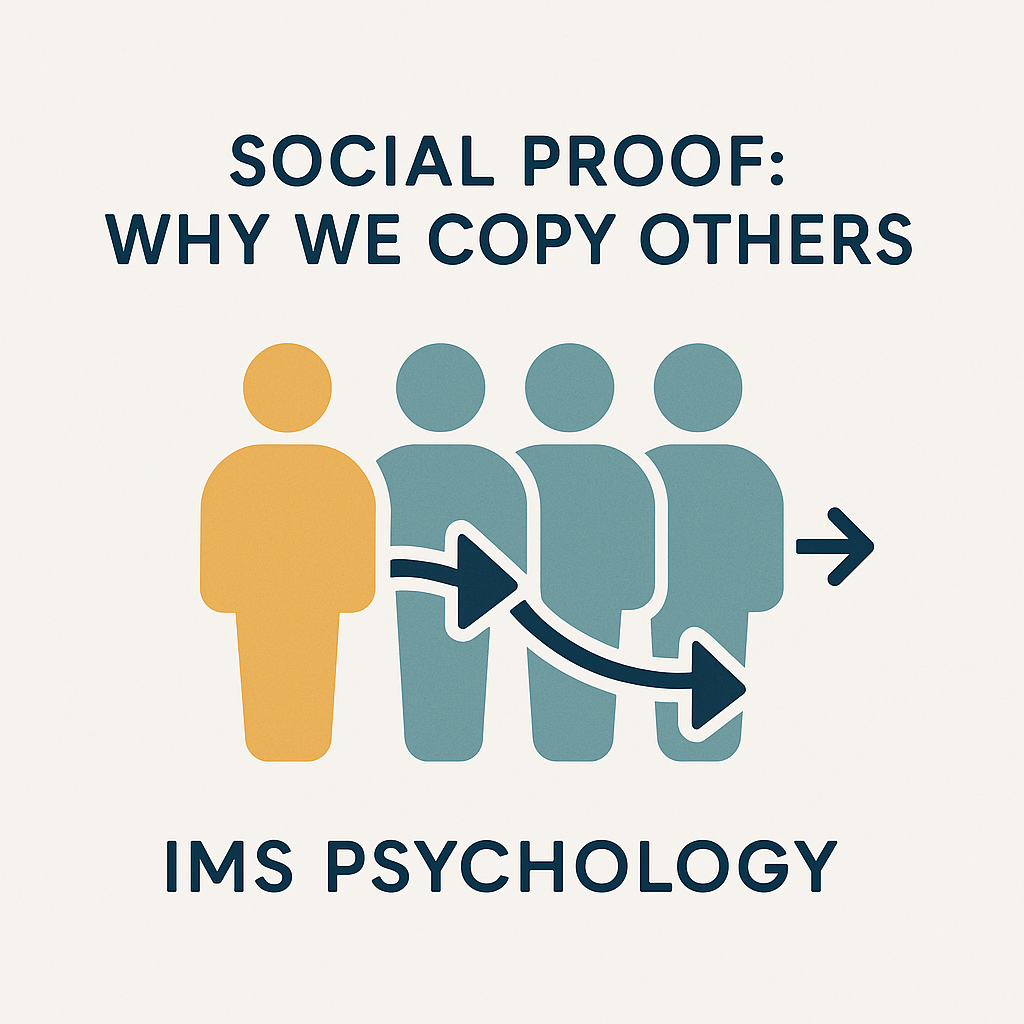
Social Proof: Why We Copy Others
Share
Social Proof: Why We Copy Others
Social proof explains why we copy others’ behavior. Learn the psychology behind it, real-world examples, and how to use it wisely in daily life.
Introduction: Why We Follow the Crowd
Imagine walking past two restaurants — one is empty, the other packed with people. Which are you more likely to choose? Most of us would head to the crowded one, assuming it must be better. This is social proof at work — the psychological tendency to copy others’ behavior when we’re unsure what to do.
Social proof is powerful because it reduces uncertainty and provides shortcuts for decision-making. But while it can guide us toward helpful choices, it can also lead us astray.
What Is Social Proof?
In psychology, social proof refers to the influence others have on our behavior, especially in situations of ambiguity. Coined by psychologist Robert Cialdini in his classic book Influence, it describes how people look to others’ actions as evidence of what’s correct or desirable.
Put simply: If others are doing it, it must be right.
The Psychology Behind Social Proof
Several psychological mechanisms explain why we copy others:
1. Uncertainty Reduction
When we don’t know the “right” choice, we assume others have better information.
2. Belonging and Safety
Humans are wired for connection. Copying others reduces the risk of rejection and increases acceptance.
3. Heuristics (Mental Shortcuts)
The brain saves energy by using others’ behavior as a shortcut for decision-making.
4. Evolutionary Advantage
In early human history, following the group increased survival. Being “the odd one out” could mean danger.
Types of Social Proof
Social proof shows up in many ways:
-
Expert Social Proof: Trusting professionals or authority figures (e.g., doctors, teachers).
-
Celebrity Social Proof: Following endorsements from famous people.
-
User Social Proof: Online reviews, testimonials, or star ratings.
-
Crowd Social Proof: Large numbers doing the same thing (e.g., viral trends).
-
Peer Social Proof: Recommendations from friends or colleagues.
Famous Psychology Experiments on Social Proof
-
Asch Conformity Experiments (1950s): Participants knowingly gave wrong answers about line lengths to match the group.
-
Milgram’s “Looking Up” Study (1969): Passersby were more likely to look up at the sky when more people were already doing it.
-
Bandura’s Social Learning Theory: Children imitated adult behavior (e.g., the Bobo doll experiment).
These studies reveal how deeply social influence shapes perception and behavior.
Real-Life Examples of Social Proof
-
Marketing: Brands highlight “best sellers” or customer reviews to increase trust.
-
Social Media: Likes, shares, and followers serve as public validation.
-
Everyday Life: Choosing restaurants, fashion trends, or even how loudly to speak in public.
The Benefits of Social Proof
-
Helps people make quicker decisions in uncertain situations.
-
Builds trust in new products, services, or ideas.
-
Strengthens social bonds through shared behavior.
The Risks of Social Proof
-
Can fuel misinformation (e.g., viral false claims).
-
Encourages unhealthy behaviors (e.g., peer pressure in adolescence).
-
Limits individuality and critical thinking.
Psychology shows that blind conformity can harm judgment — making awareness crucial.
How to Use Social Proof Wisely
-
Pause & Reflect: Ask, “Am I following because I believe it, or because others do?”
-
Seek Diverse Perspectives: Avoid echo chambers by consulting multiple sources.
-
Balance Belonging with Authenticity: It’s okay to follow trends — as long as they align with your values.
-
Marketers & Professionals: Use social proof ethically — highlight genuine reviews, case studies, or community trust.
When Social Proof Shapes Mental Health
For people struggling with anxiety, insecurity, or self-doubt, social proof can either help (through supportive communities) or harm (through comparison and pressure). Therapies like CBT can help individuals recognize when they’re conforming at the expense of authenticity.
Practical Tools You Can Use Today
IMS Psychology provides downloadable, evidence-based workbooks to help people explore self-awareness, confidence, and decision-making. Our [Social Influence & Self-Confidence Workbook] includes exercises to recognize when you’re copying others and tools to strengthen authentic choices.
Conclusion: From Copying to Conscious Choice
Social proof is a powerful force — it helps us navigate uncertainty, feel safe, and connect with others. But when unexamined, it can also trap us in conformity and unhealthy patterns.
By understanding the psychology of social proof, you can recognize when it serves you — and when it’s time to pause, reflect, and choose your own path.
If you’d like guided exercises to strengthen self-confidence and decision-making, explore the IMS Psychology workbooks, designed to turn insight into daily growth.
written by,
Martin Rekowski (03.10.2025)
Internal Suggestion
Social Influence & Self-Confidence Workbooks (or similar product in our shop).
External Source
[Cialdini, R. B. (2007). Influence: The Psychology of Persuasion.]